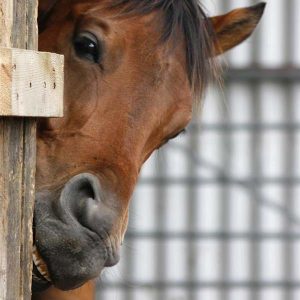
Wood Chewing in Horses
Wood chewing can be an annoying and destructive behavior in horses.
Understanding why horses chew wood and incorporating strategic management practices into your routine can help eliminate the problem.
Researchers have documented an increased incidence of wood chewing in cold, wet weather (Jackson et al., 1994). It is thought that the drop in temperature causes horses to instinctively seek out additional fiber, which they find in the form of wooden fences, barns or trees. In their natural state, wild horses will incorporate a small amount of woody fiber into their diet in the winter months. Therefore, some wood chewing may be considered normal behavior.
According to noted equine behaviorist Dr. Katherine Houpt at Cornell University, diets lacking in long-stemmed fiber (hay or grass) results in increased wood chewing.
Her research found this to be the case when the hay or pasture was inadequate, or when significant quantities of fiber were provided in the form of pellets instead of hay.
For some horses, boredom or lack of exercise is the culprit. Lengthy stall confinement where meals are consumed quickly leads to boredom. Inclement winter weather can reduce turnout time, while short day length and bad weather often reduce riding time. For horses that would naturally spend the majority of their day walking around grazing on long-stemmed fiber, being cooped up in a stall or small lot can lead to multiple behavioral issues, including wood chewing.
While nutritional deficiencies are thought to be linked to some form of pica (the eating of unusual things), they do not seem to play a role in wood chewing. It is generally agreed upon that wood chewing is a signal that a horse is craving more roughage.
If wood chewing becomes a problem in your stable, equine behaviorists believe you can implement three management strategies to reduce the behavior.
- Feed increased amounts of long-stemmed hay.
- Provide plenty of “chewing time” by making sure the hay is consumed continuously or slowly.
- Encourage routine exercise to protect against boredom.



6 Comments
I have a mare that is eating huge hunks of the side of the barn. She is out 24/7 on very good pasture (we had massive rains in May and more grass/weeds than ever). She gets Strategy pelleted feed. Currently I’m not haying her because we have so much pasture. Any other ideas?
I would suggest you provide some hay and see if this reduces your mare’s desire to chew on the barn. Additional hay will provide the fiber she is craving.
With all the rain the grass may actually be growing so quickly that it contains less fiber than normal. Take a good look at the plants in your pasture and make sure the unpalatable weeds are not outcompeting the grasses and leaving less good-quality forage for your horse to eat.
Review her schedule as well. Has she experienced a reduction in exercise? Is she spending more time than usual in her pasture? Wood chewing is often a sign of boredom. Also consider if there are other changes that might have caused her some mental stress. Has she lost a pasture-mate recently or perhaps a new horse has been introduced into the herd? Changes can be more stressful to a horse then we realize and her current behavior might be a symptom.
Karen Isberg
Ive recently noticed that my mare has been chewing the wood in her barn for some apparent reason. I’ve gone through multiple websites and have tried to gain information on what would be causing this behavior. She’s always given free choice hay, she has access to a mineral white salt block, and is given fresh water. I just recently started her out on grain and since then I’ve seen a change in her wood chewing behavior. I’m going to consult with my veterinarian shortly to find out what the real cause of my mare behaviors are coming from. This article really helped me get a better understanding of what wood chewing is caused by or from and ways to prevent it from happening, thank you.
Lynn,
Thank you for letting us know that you found the article helpful. We hope you figure out what is bothering your mare and get the issue rectified quickly.
For my mare, if she is chewing wood or anything else that she shouldn’t, it is out of anger/frustration. Examples: 1 – She was chewing wood in her stall after a new mare moved into the stall next door to her. The new mare had a hard time settling in and would kick the stall quite often. 2 – If I am tacking her up in her stall and she is loose, when I go to cinch her girth she will try to find wood to chew on.
For the first situation we went around her stall and any where that she was chewing we rubbed a bar of soap. The mare next door also settled in eventually and it was no longer a problem. The second situation, I just don’t let her do it. Fortunately she knows when mama says no, she means it and respects it.
Pingback
[…] From the KPP Blog: […]